#emperor taizong
Text
Chapter 10 Recap: The Old Dragon King's foolish schemes transgress Heaven's decrees; Prime Minister Wei's letter seeks help from an official of the dead
Leaving Xuanzang for a time, the narrative now turns to “two worthies who lived on the banks of the river Jing outside the city of Chang’an: a fisherman by the name of Zhang Shao and a woodman by the name of Li Ding.” Though not official scholars, they are both learned men. One day, after selling their wood and fish and getting drunk, they walk back home along the Jing River, extoling the virtues of poverty and humble living while arguing primarily through poetry over whether Zhang Shao’s “fair waters” or Li Ding’s “blue mountains” are better. They enjoy themselves in this manner until their paths diverge. Yet in saying farewell, Zhang Shao angers Li Ding with the “unlucky” suggestion that his friend might encounter a tiger while climbing back up the mountain. Li Ding rejoins him by stating that if he’s to be harmed by a tiger, then Zhang Shao’s boat “will surely capsize.” Yet Zhang Shao states he’s confident that he’ll never have such an accident. He then reveals that thanks to an extremely accurate fortune teller whose predictions he buys daily with a golden carp, he has no worry of danger and works with the knowledge that his nets will always be full of fish and shrimp. Zhang Shao promises Li Ding that tomorrow he’ll sell his catch for some more wine that they can share, and the two men part.
The story really begins when a yaksa patrolling the Jing River hears about this fortune teller whose predictions are never wrong. Rushing back to the Water Crystal Palace, the yaksa gives the Dragon King a report of this newly discovered disaster; for if the fortune teller is that accurate, and if Zhang Shao consults with him daily to know where he should cast his net, “will not all our water kin be exterminated?” Enraged at this news about the possible brewing extinction, the Dragon King wants to kill the fortune teller immediately. Yet what seems to be his entire court persuades him to first guise himself as a scholar and see for himself if this news about the fortune teller is true. If the Dragon King went out in his true form, after all, he would bring the clouds and the rain with him, which would likely both terrify the people of Chang’an and offend Heaven.
Taking this advice to heart, the Dragon King duly changes his shape into that of a white-robed scholar and sets off to confront the fortune teller. When he arrives at the fortune teller’s shop he’s treated to tea, and asks the fortune teller about the weather tomorrow, including how much it will rain. The fortune teller gives him a very precise answer, even down to how many extra drops will fall. Laughing, the Dragon King tells the fortune teller that his prediction best be correct, for “If it rains tomorrow and if it is in accordance with the time and the amount you prophesied, I shall present you with fifty taels of gold as my thanks. But if it does not rain, or if the amount and the hours are incorrect, I tell you truly that I shall come and break your front door to pieces and tear down your shop sign” before driving him out of Chang’an. The fortune teller amiably agrees.
Returning to his watery palace, the Dragon King tells the various aquatic deities about these adventures, and they all have a good laugh at the fortune teller for making such a weather-based prediction with the deity in charge of the local weather. At that moment, however, the Dragon King of the Jing River is given a decree from the Jade Emperor commanding him to make it rain the exact amount and at the exact time that the fortune teller predicted. Greatly upset by this, the Dragon King is lamenting his coming loss before one of his counselors advises him to have the rain miss the timing and the amount specified in the decree by “a mere fraction.” This would result in the fortune teller losing the wager, and he could then be driven out of Chang’an. The Dragon King takes this counsel and stops worrying.
The next day the Dragon King gathers the weather deities and makes it so that the time and amount of rain specified in the decree was altered by an hour and by three inches and eight drops respectively. Afterwards he dons his scholar disguise once again and barges into the fortune teller Yuan Shoucheng’s shop and, “without a word of explanation,” begins to smash it up. Yuan Shoucheng remains unmoved through this destruction until the Dragon King threatens to hit him with one of the shops doors and accuses him of being a charlatan, only then revealing that not only did he know this seeming scholar is actually the Dragon King of the Jing River, but as he had “disobeyed the decree of the Jade Emperor and transgressed the law of Heaven,” he’ll surely be executed.
Hearing this, the Dragon King is struck with fear. He kneels before Yuan Shoucheng, begging the fortune teller for some way to save his life. Yuan Shoucheng tells the dragon that while he personally can’t do anything, it’s possible that Emperor Tang Taizong could. The Dragon King, after all, is scheduled to be executed by the human judge Wei Zheng, and Wei Zhen is Emperor Taizong’s prime minister. If the dragon gains Emperor Taizong’s favor, then his life will therefore be spared. The Dragon King takes this to heart and goes to do so, leaving the fortune teller with tears in his eyes.
Waiting until night, the Dragon King visits Emperor Taizong in a dream and, explaining the situation, begs him to spare the dragon’s life. Emperor Taizong tells the Dragon King that he can certainly save him, and the dragon, expressing his gratitude, leaves delighted.
Waking up and holding court, Emperor Taizong soon realizes that Wei Zhen is not present among the other civil officers. He tells the court of his dream and his promise, and the civil official Xu Shizhi recommends that the emperor summon Wei Zheng to court immediately and be kept there for a whole day, after which the dragon will be safe. The Tang emperor is delighted at this advice, and gives the order for it to be carried out.
Meanwhile, prime minister Wei Zheng is given the decree from the Jade Emperor to execute the dragon, which he prepares for by bathing, fasting, exercising his spirit, and sharpening his magic sword. He’s left flustered at Emperor Taizong’s command to attend court, but he obeys. He and the emperor spend a good portion of the day discussing state matters as the hour grows later and later until, the rest of the ministers having left, the Tang Emperor proposes a chess game. The two play for quite some time until Wei Zheng abruptly falls asleep. While Wei Zheng is mortified at having done so when he next awakens, Emperor Taizong merely laughs it off and suggests they start a new game. Yet right afterwards the ministers Qin Shubao and Xu Mougong rush into the chamber bearing “a dragon head dripping with blood.” Almost all assembled are shocked until Wei Zheng explains that he had just executed the dragon in his dream. Learning of his prime minister’s abilities, Emperor Taizong is left both delighted that he had “a minister as good as Wei Zheng,” and sad that he wasn’t able to uphold his promise. Nevertheless, he orders Suhbao to hang the head up in the market “so that the populace of Chang’an might be informed,” and rewards Wei Zheng. Afterwards, all the various ministers disperse.
Though he had rewarded Wei Zheng for carrying out his heaven-mandated duty, Emperor Taizong nevertheless returns to his palace “in deep depression, for he kept remembering the dragon in the dream crying and begging for his life.” And his situation but worsens when the dragon starts haunting him, first making his presence known when “the sound of weeping was heard outside the door of the palace,” and then the Dragon King himself appears before the Tang Emperor in his dreams, “holding his head dripping with blood in his hand, and crying in a loud voice: ‘Tang Taizong! Give me back my life…I am going to argue this case with you before the King of the Underworld.” The dragon then seizes Taizong and may have dragged him off to diyu if not for the intervention of Guanyin, who had come “specifically to drive the accursed dragon away and to rescue the emperor.” The Dragon King then goes to file suit in the Underworld.
The Tang Emperor, for his own part, wakes up yelling “Ghost! Ghost!” and so frightens his inner chamber that no one could get any more sleep for the rest of that night. He furthermore does not appear at court the day afterwards, but sending a message that he isn’t feeling well. This situation continues for a few days before both the court and the queen mother insist that a physician be brought in. This doctor has nothing but bad news, and announces that the emperor’s illness is at such a stage where he’ll die within seven days.
In a state of alarm, the various ministers visit the emperor, who tells them that he’s being haunted. It’s a statement that drives the minister Yuchi Gong to ask why Emperor Taizong should fear ghosts, as “When you established your empire…you had to kill countless people.” Yet hearing further on how ghosts are attacking the emperor, two of the ministers suggest they stand guard at the palace gate. Taizong agrees to this scheme.
That evening, the two ministers, “in full battle dress and holding golden bludgeon and battle-ax, stood guard outside the palace gate.” And thanks to them, Emperor Taizong was able to rest peacefully. Yet they aren’t able to guard against the emperor’s diminishing appetite or against his illness becoming more severe. No matter what is done the Tang Emperor’s condition continues to worsen until Wei Zheng informs him that there is a way “that will guarantee long life for Your Majesty.” And that way is to go to Hell and deliver a letter from Wei Zhen to Cui Jue, who was “the subject of the deceased emperor” who later became a judge in the Underworld. Wei Zheng and Emperor Taizong plan to visit the underworld to do so, and do indeed leave as spirits, even though this makes the emperor appear to be dead to everyone else. And this is where this chapter ends. If you want the ending this this arc, you’ll have to wait for the next chapter.
#jtjttw chapter recap#jttw reading group#jttw book club#xiyouji#journey to the west#jttw#emperor taizong#tang emperor
9 notes
·
View notes
Text
❁ Li Zhi (Emperor Taizong) and Wu Meiniang (Wu Zetian) in Secret History of Empress Wu episode 6 ❁




#secret history of empress wu#wu zetian#emperor taizong#yin tao#yu shaoqun#li zhi#wu meiniang#perioddramaedit#cdramaedit#gifshistorical#guzhuangappreciation#aesthetics#tang dynasty#madeintrina
13 notes
·
View notes
Note
hey, you mentioned that, in JTTW, the Tang emperor is "described as an someone who had “countless people” killed, including, or so the text heavily implies, his own brothers".
I was wondering exactly what chapter this was in?
Hello! So the part about Emperor Taizong killing "countless people" is mentioned in the Anthony C. Yu translation, Vol. 1, pg. 256 (pdf version), when a man named Yuchi Gong tells the Tang emperor who was feeling ill due to being haunted that "'When you [Emperor Taizong] established your empire...you had to kill countless people. Why should you fear ghosts?'"
The second part is also in Vol. 1 of the Yu translation, pg. 261 (pdf. version). Here Emperor Taizong is touring the underworld and is accosted by "the emperor's predecessor Li Yuan, his elder brother Jiancheng, and his deceased brother Yuanji, who came towards them, shouting, 'Here comes Shimin! Here comes Shimin!' The brothers clutched at Taizon and began beating him and threatening vengeance."
This scene is based in the historical realities of Emperor Taizong's rise to power. Li Shimin was Emperor Taizong's name before he became Emperor. Li Jiancheng and Li Yuanji were his elder and younger brother respectively. Li Yuan was his father who ruled as the Emperor Gaozu. Li Shimin became Emperor Taizong after he killed Li Jiancheng himself, his general Yuchi Jingde killed Li Yuanji, and Emperor Gaozu was coerced into naming Li Shimin the crown prince and soon after yielding the throne to Li Shimin, who was then dubbed Emperor Taizong.
The beginning of Emperor Taizong's reign is marked by bloodshed, fraternal murder, and warfare, but he has gone down in history as one of China's greatest emperors for having solidified imperial protection over Chinese regions and for thus ushering in an age of economic and military flourishing & the peace and prosperity that came with that.
31 notes
·
View notes
Text
Great Sage Emperor
Those who have read Journey to the West (1592) will remember that it is Tang Emperor Taizong (唐太宗) who sends Tripitaka on the quest to India. Well, I was interested to learn that the monarch's historical posthumous title includes "Great Sage" (Dasheng, 大聖):
Wenhuang 文皇 (The August Cultured [Emperor]) ... is the original posthumous title given to Li Shimin following his death in 649. The title was expanded to "Wenwu Sheng Huangdi" 文武聖皇帝 (The Cultured Military Sagacious August Emperor) in 674 and was later again changed to "Wenwu Dasheng Daguangxiao Huangdi" 文武大聖大廣孝皇帝 (The Cultured Military Grand Sagacious Grand Extensive Filial August Emperor) in 754 (Jiu Tang shu, 3.62-63) (Nienhauser, 2010, p. 202 n. 34).
My own clunky translation for the latter is the "Great, Universally Filial Emperor and Great Sage of Civil and Military Affairs." [1]
His title is interesting because, as I've mentioned elsewhere, Taizong bestows Sun Wukong's literary precursor, the "Monkey Pilgrim" (Hou xingzhe, 猴行者), with the name “Great Sage Steel Muscles and Iron Bones” (Gangjin Tiegu Dasheng, 鋼筋鐵骨大聖) at the end of the 13th-century JTTW (Wivell, 1994, p. 1207).
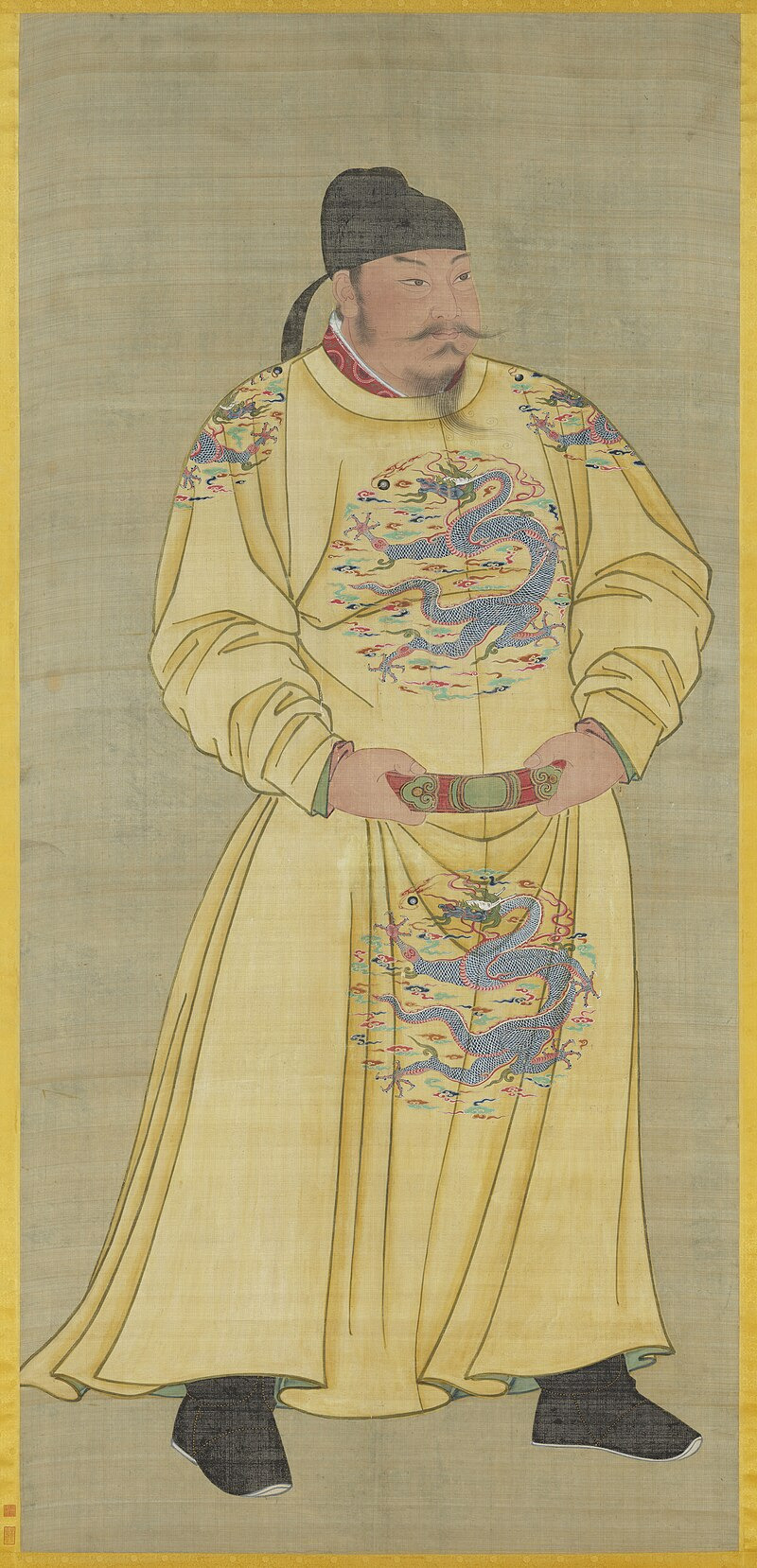
Note:
1. The guangxiao (廣孝) of Wenwu Dasheng Daguangxiao Huangdi (文武大聖大廣孝皇帝) means to be filial to everyone, so I went with "Universally Filial."
Sources:
Nienhauser, W. H. (2010). Tang Dynasty Tales: A Guided Reader. Japan: World Scientific.
Wivell, C.S. (1994). The Story of How the Monk Tripitaka of the Great Country of T’ang Brought Back the Sūtras. In V. Mair (Ed.), The Columbia Anthology of Traditional Chinese Literature (pp. 1181-1207). New York: Columbia University Press.
#sun wukong#monkey king#journey to the west#jttw#Tang Taizong#Chinese emperor#Great Sage#lego monkie kid#LMK#Tang dynasty
35 notes
·
View notes
Text
Honestly rip to Tang Taizong he has the worst spirit weapons
Like Wu Zetian? She gets a flash bomb, charm eyes a whip, a hammer and a dagger??
Qin Shi Huang has a sword that he can only summon it if someone tells him to, sure, but he also has dope water powers, time slowing, and a pretty cool army he can summon in his tomb
Meanwhile what does Tang Taizong get? A bow that hurts him every time he hits anything! What's even the point of that??
63 notes
·
View notes
Text
proposal: the NFSI (Notable Failson Index), where all hereditary monarchies are judged by how long it takes for a notable failson to come into power
#my rambles#ex. han dynasty - whatever the name of that one guy who came after emperor zhao is#so (grouping all the child puppet emperors as just 'empress lv') an NFSI of 5 emperors#tang.... y'know what I'm going to count li longji as a notable failson that's gaozu taizong gaozong wu zetian and then li longji#so an NFSI of 4#and so on#I would like to say me calling li longji his name and not his like emperor name is a sign of disrespect from me-#-but tbh it's just that I could never remember what it is#right xuanzong thought that was what it is - ah idc still going to call him li longji (homonym of 'dragon chicken') to amuse myself#deeply unserious#10n
11 notes
·
View notes
Text
Zachary Ying and the Dragon Emperor | Book Review
Author: Xiran Jay Zhao
Genre: Middle-Grade Fantasy, Chinese Mythology
Publisher: Margaret K. McElderry Books
Release Date: 10/05/2022
Rating: 4/5 🌟🌟🌟🌟
Synopsis:
Zachary Ying never had many opportunities to learn about his Chinese heritage. His single mom was busy enough making sure they got by, and his schools never taught anything except Western history and myths. So Zack is woefully unprepared when he discovers he was born to host the spirit of the First Emperor of China for a vital mission: sealing the leaking portal to the Chinese underworld before the upcoming Ghost Month blows it wide open.
The mission takes an immediate wrong turn when the First Emperor botches his attempt to possess Zack’s body and binds to Zack’s AR gaming headset instead, leading to a battle where Zack’s mom’s soul gets taken by demons. Now, with one of history’s most infamous tyrants yapping in his headset, Zack must journey across China to heist magical artifacts and defeat figures from history and myth, all while learning to wield the emperor’s incredible water dragon powers.
And if Zack can’t finish the mission in time, the spirits of the underworld will flood into the mortal realm, and he could lose his mom forever.
Review:
tw//: bullying.
First off, I loved this book; I seriously loved it! But I gotta admit that it had a significant pacing problem. It threw you into the action all willy-nilly, then did a poor job explaining things with info-dump after info-dump. However, I believe that’s very intentional since this book is inspired by Shonen anime!
Anywho, I so loved how visual this book was, how I could just see almost everything Zack and the gang were doing from the vivid descriptions. I love how it pays homage to Yugi-oh!! And I adore how well it explored the different identities that makeup who Zack is.
It was a bit too on the nose regarding politics, but then again, with the way most adults lack reading comprehension and critical thinking skills these days, I think it’s good that a middle grade novel is being very straightforward with its message.

#booknerd#bookworm#booklover#bookstagram#books#book review#middle grade#fantasy#chinese mythology#zachary ying and the dragon emperor#zachary ying#xiran jay zhao#hui muslim#wu zetian#tang taizong#qin shi huang#the dragon emperor
3 notes
·
View notes
Text
I’m absolutely in love with Zachary Ying and the Dragon Emperor. I loved everything about it.
Here is just an excerpt that had me laughing histerically:
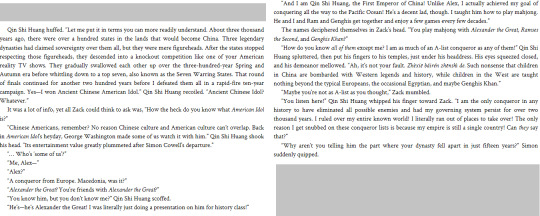
#zachary ying and the dragon emperor#zachary ying#qin shi huang#tang taizong#simon li#xiran jay zhao
56 notes
·
View notes
Text
I feel like most of my memes about this book don’t make any sense or are too specific, but you have to hand it to Xiran Jay Zhao because this is a very memeable book in addition to being well written, entertaining, full of fun history etc etc.
#Zachary Ying and the Dragon Emperor#I literally laughed out loud when Qin Shi Huang was like you also ate the pills and Tang Taizong's Allegedly!#truly I wasn't expecting half the gold from this book and yet!!
44 notes
·
View notes
Text
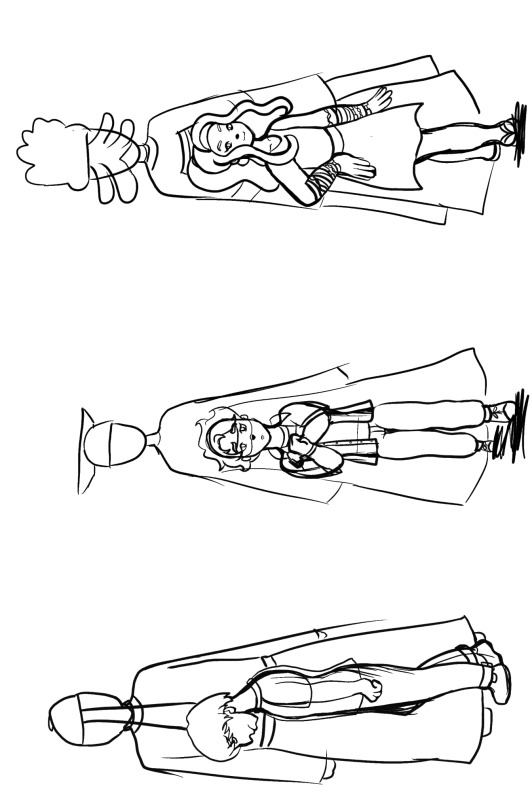
I have a lot of missed posts to catch up on so here! This was day 29 of my 30 day art challenge and I had to do fanart so I took this chance to do some Zachary Ying fanart because there is not enough and I fell in love with this after I reread it recently. Ignore the emperors in the back I was gonna include them more detailed but I was tired so I focused more on Melissa, Simon and Zachary. Zachary Ying was written by Xiran Jay Zhao yall should read it btw. (Also ignore how instagram is annoying and forced this sideways if it wasn't it would only show Zachary lol)
#improvementhell#zachary ying and the dragon emperor#zachary ying#melissa wu#simon li#wu zetian#tang taizong#qin shi huang#ying zhuyang#wu mingzhu#li shuda
0 notes
Text
Chapter 12 Recap: The Tang emperor, firmly sincere, convenes a Grand Mass; Guanyin, in epiphany, converts Gold Cicada
This chapter begins with an account of the demon guardian leading Liu Quan and his wife out of the Region of Darkness and into their proper bodies; Liu Quan into his own, and Cuilian into that of Princess Yuying’s, who the demon guardian caused to die by crashing into her and snatching her soul away. This finished, the demon guardian departs, leaving Emperor Taizong to sigh over the death and then seeming derangement of his sister and for a newly-embodied and very confused Li Cuilian to insist she’s not the emperor’s sister. The issue is cleared up when a newly resurrected Liu Quan makes his report, and husband and wife go back home happily.
The story then turns to Xiang Liang, who Emperor Taizong had borrowed money from in the underworld and who we learn “made his living by selling water, while his wife…sold pottery in front of their home.” The had built an enormous amount of wealth and merit in the Region of Darkness because they gave the majority of their money in the World of Light away either as alms to monks or as gifts to the dead through purchasing and burning paper money. This humble couple are left “terror-stricken” when minister Yuchi Gong comes to their home with a vast amount of gold and silver and, even after hearing why the emperor wants to give them so much money, refuse it all. Declaring Papa Xiang and Mama Xiang “virtuous elders,” Emperor Taizong decrees that the money should be used to “erect a temple [soon to be known as the Royal Xiangguo Temple], to build a shrine, and to support the religious services that would be performed in them.” This temple still stands today.
Exceedingly pleased by the completion of the temple, Emperor Taizong then orders that a public notice is to be sent out that would invite monks to celebrate the Grand Mass of Land and Water, “so that those orphaned souls in the Region of Darkness might find salvation.” The monks arrive in less than a month’s time, though they are coming from all over China. Emperor Taizong also orders the court historian Fu Yi to select the priest who would preside over the ceremonies. Fu Yi, however, instead presents a memorial attempting to disavow the Buddha’s worth, going so far as to call Buddhism “a foreign intrusion in China.” The Tang Emperor has this memorial distributed among the officials for discussion. Prime minister Xiao Yu comes forward to defend the teachings of Buddha and recommends that Fu Yi, for “he who spurns a sage is himself lawless,” be “severely punished.” This sparks a debate in which Xiao Yu and Fu Yi argue over the merits of Buddhism and which ends when Emperor Taizong, agreeing with the Lord High Chamberlain Zhang Daoyuan that the Three Religions—Buddhism, Taoism, and Confucianism—are to be respected. After that, a law is passed that anyone who “denounces a monk or Buddhism will have his arms broken.” The Tang emperor, having settled this religious debate, orders again for the site for the Grand Mass to be prepared and for someone “of great merit and virtue” to be selected as the altar master.
It likely comes as no surprise that Chen Xuanzang is selected for the potential fulfillment of this role, being a man who, despite an impressive lineage, “had no love for glory or wealth, being dedicated wholly to the pursuit of Nirvana.” He was further well versed in the “thousands of classics and sutras,” and “none of the Buddhis chants and hums were unknown to him.” Emperor Taizong, especially after learning that Xuanzang is the son of Grand Secretary Chen Guangrui, is delighted to appoint him the Grand Expositor of the Faith, Supreme Vicar of Priests.
In this new role, Xuanzang selects a “total of one thousand two hundred worthy monks, young and old” to conduct the Grand Mass of Land and Water, which would last forty-nine days. After much practice and at an auspicious time, Emperor Taizong arrives at the temple to greet the monks and encourage them. That very same night, Bodhisattva Guanyin learns about Taizong’s actions to hold the Grand Mass and that the chief priest is Xuanzang—“who happened also to be the very elder who she had sent to this incarnation”—and sets off immediately to “sell” the treasures she was given by the Buddha to gift to the scripture pilgrim. These are the “embroidered cassock with rare jewels and the nine-ring priestly staff.” She keeps the “Golden, the Constrictive, and the Prohibitive Fillets” hidden for later use.
Guising herself as a “monk covered with scabs and sores, barefooted and bareheaded,” Guanyin and Moksa soon reach the Eastern Flower Gate and run into chief minister Xiao Yu. Guanyin and Xiao Yu have a brief exchange on why she’s asking for so much money for the cassock and the staff, with Guanyin stating she’d be happy to give the cassock away to someone who is worthy. Xiao Yu is delighted at these words, for he believes that Chen Xuanzang is just the man the disguised Guanyin is looking for. He invites her to have an audience with the emperor, and she’s happy to comply.
Having been greeted with the sight of his chief minister accompanied with two monks “covered in scabs and sores,” Emperor Taizong is soon given a full account on why the cassock and the nine-ring priestly staff are so precious and, pleased by the response and by the sight of these precious objects, offers to buy them. Guanyin, however, refuses all payment, merely stating again that “anyone who reveres the Three Treasures, rejoices in virtue, and submits to our Buddha will be given the treasures free.” Guanyin leaves the treasures behind with the Tang Emperor to give to the monk of his choice, and shortly afterwards Emperor Taizong summons Xuanzang. The emperor tells the monk to try on the cassock and to hold the staff, and everyone around is left awestruck by “how imposing, how elegant and fine” Xuanzang looks with them. Emperor Taizong tells Xuanzang to keep the cassock and the staff, and then the monk, along with an honor guard and many other officials, make a procession on the main streets toward the temple, with many exclaiming over how fine Xuanzang looks. The procession finally reaches the temple, and everyone goes to their assigned seats.
The celebration of the Grand Mass is now to be held, attracting a huge crowd. Bodhisattva Guanyin and Moksa are among the observers, as they want to see “how the mass is going; second, we want to find out whether Gold Cicada is worthy of my treasures; and third, we can discover what division of Buddhism he is preaching about.” Guanyin discovers that Xuanzang is indeed redeeming lost souls through the mass, who are all approaching unseen. Even so, in her monk’s guise Guanyin approaches Xuanzang and berates him because “You only know how to talk about the teachings of the Little Vehicle” without saying anything about the Great Vehicle.” Xuanzang is delighted by this chance to learn more Buddhist doctrine and, leaping down from the platform he was on, greets her as his “Venerable Teacher.” Guanyin goes on to say that the teachings of the Little Vehicle “cannot save the damned by leading them up to Heaven; they can only mislead and confuse mortals.” She also states that she possesses “Tripitaka, three collections of the Great Vehicle Laws of Buddha, which are able to send the lost to Heaven, to deliver the afflicted from their sufferings, to fashion ageless bodies, and to break the cycles of coming and going.”
Before Xuanzang can respond to any of this, it’s reported to Emperor Taizong that the mass was stopped when the main monk “was pulled down by two scabby mendicants, babbling some kind of nonsense.” The Tang emperor orders their arrest, and Guanyin and Moksa are brought before him. Yet upon revealing again that she has in her possession “the Tripitaka, the Great Vehicle Law of Buddha, which is able to save the damned, deliver the afflicted, and fashion the indestructible body,” Emperor Taizong is delighted and eagerly asks where it is. Guanyin tells him that the Tripitaka is at “the place of our lord, Tathagata…in the Great Temple of Thunderclap, located in India of the Great Western Heaven.” She the agrees to lecture on some of the Great Vehicle and reveals her true form, compelling all assembled to bow down and chant “Namo Bodhisattva Guanshiyin!”
Emperor Taizong immediately orders a skilled painter to sketch Bodhisattva Guanyin, and that honor goes to a man named Wu Daozi. The Tang emperor also orders the Mass to a halt. He does this because he wants to wait for someone to bring back the scriptures of the Great Vehicle before resuming “our sincere efforts to cultivate the fruits of virtue.” The question then, of course, is who would be willing “to seek scriptures from Buddha in the Western Heaven.” Xuanzang immediately volunteers himself, stating that though he has no talents, he “is ready to perform the service of a dog and a horse. I shall seek these true scriptures on behalf of your Majesty, that the empire of our king may be firm and everlasting.” Emperor Taizong is highly pleased at this, and makes Xuanzang his bond brother. Xuanzang, for his own part, vows to not return home until he has the scriptures or dies trying.
After everyone has dispersed back to their homes and Xuanzang returns to the Temple of Great Blessing, he’s greeted by many monks and several of his own disciples, all of them wanting to know if it’s true he “vowed to go to the Western Heaven.” Xuanzang isn’t put off in the slightest from descriptions on how “the way to the Western Heaven is long, filled with tigers, leopards, and all kinds of monsters”; he made his vow to either get the scriptures or fall “into eternal perdition in Hell.” He tells his disciples that the journey could take anywhere from two to seven years, but that they will know of his return when “you see the branches of the pine trees within our gate pointing eastward.”
The next morning Taizong has a formal rescript written up “stating the intent to acquire scriptures and stamped it with the seal of free passage,” ensuring (so he hopes) that Xuanzang can travel without trouble from civilian forces. He presents this to Xuanzang along with “a bowl made of purple gold for you to collect alms on your way” as well as two attendants and a horse. The monk is now ready and eager to begin the journey. Yet before he sets off, the Tang emperor gives him the byname of “Tripitaka” after the scriptures he seeks, and though Xuanzang had always abstained from wine the two drink one cup apiece as a toast to the pilgrimage. Emperor Taizong also sprinkles a handful of dirt into Tripitaka’s cup, explaining to the confused monk that, as Xuanzang thinks the journey will take him three years, that this is to remember to “Treasure a handful of dirt from your home, /But love not ten thousand taels of foreign gold.” Tripitaka thanks the emperor for the gesture, and the two separate, Emperor Taizong to his palace, and Chen Xuanzang to the start of the journey. And thus at lost last begins the journeying part of Journey to the West.
#jttw chapter recap#journey to the west#xiyouji#jttw#bodhisattva guanyin#xuanzang#tripitaka#emperor taizong#jttw reading group#jttw book club
7 notes
·
View notes
Text
🐲WISH EVERYONE HAVE A HAPPY LONG(龍/Dragon)YEAR

Wish everyone good luck in the year of the dragon and happy holiday!!
This is my first time to draw such big dragon, I kinda worried but surprisingly it's okay(ˊᗜˋ*)
2024 is the year of the Green Dragon(青龍) and also the year of the Wood Dragon.
※青 originally meant blue in ancient times, but in painting colors, if blue is mixed with a small amount of green, it is called cyan (one of the three subtractive primary colors), and it has multiple levels.So the dragon I drew is closer to blue><
【Historical Artifacts Reference 】:
Princess Xincheng新城公主 of the Tang Dynasty (634-663)
Princess Xincheng新城公主 was the youngest daughter of Emperor Taizong of the Tang Dynasty in China and was born to the eldest Zhangsun Empress.
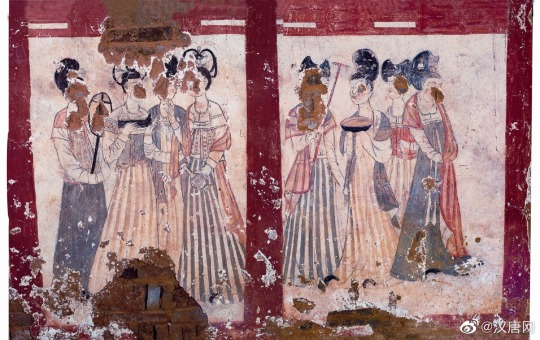
Various Hairpin were Unearthed from the Tang Dynasty Tomb of Princess Yang of Wu
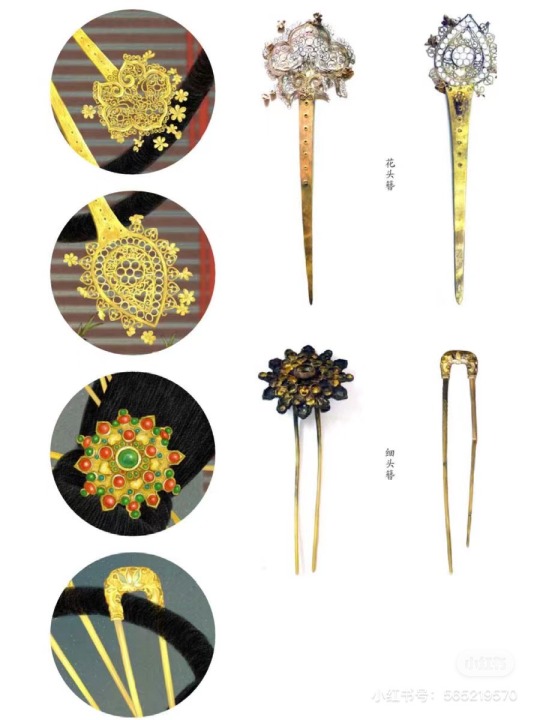
#chinese hanfu#chinese new year#year of the dragon#new year 2024#hanfu accessories#hanfu_challenge#chinese traditional clothing#chinese#china#hanfu#original illustration#hanfu illustration#illustrator#漢服#汉服#中華風#chinese style#cny2024
270 notes
·
View notes
Text
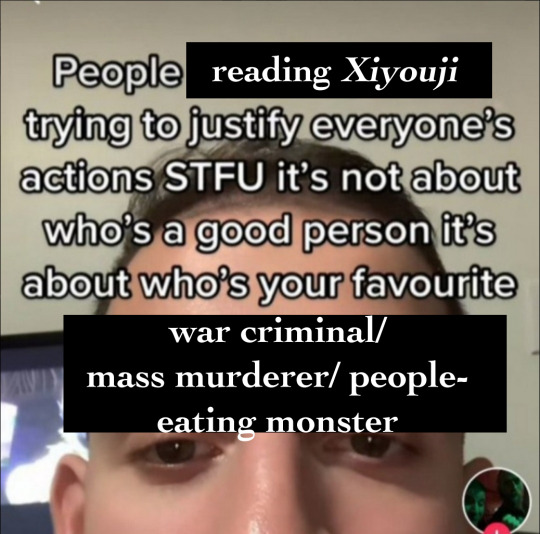
Fully aware that Journey to the West is a classical story of redemption, complex motivations, atonement, selfishness, spiritual cultivation, and the struggle to Enlightenment, but for even all my own personal posts going over multiple character's underlying reasons for being what they are it's good to remember this too.
#xiyouji#journey to the west#jttw#when I tell you that to this day I'm floored by how casual not just sun wukong#but the jade emperor and emperor taizong were about killing countless individuals...#journey of brutal honesty about the violence commonly behind power fr#yeah you can see how a religion that promoted peace would be very attractive under these circumstances
80 notes
·
View notes
Text
Romance Club week festivities with interviews from our favorite authors, technical designers, artists and the boss Vlad...
📣Stay tuned upcoming interview with Arina (Theodora & W: Time Catcher) and the boss project manager Vlad...
First we'll start with Wincy Wong author of Heart of Trespia and Soulless
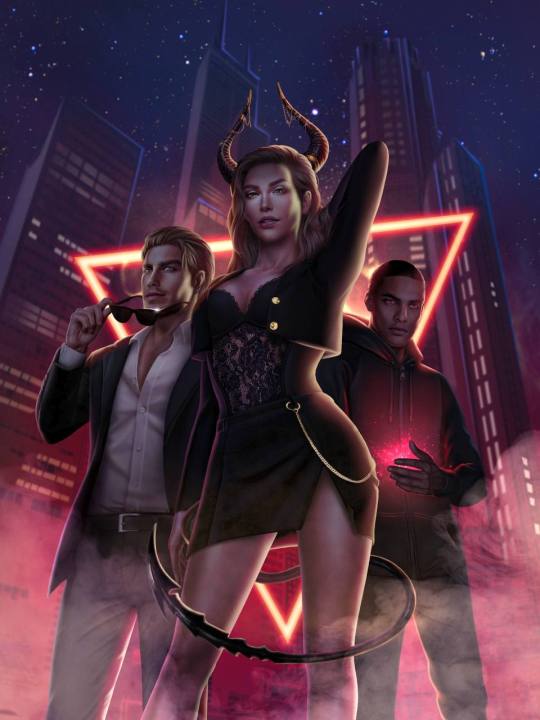
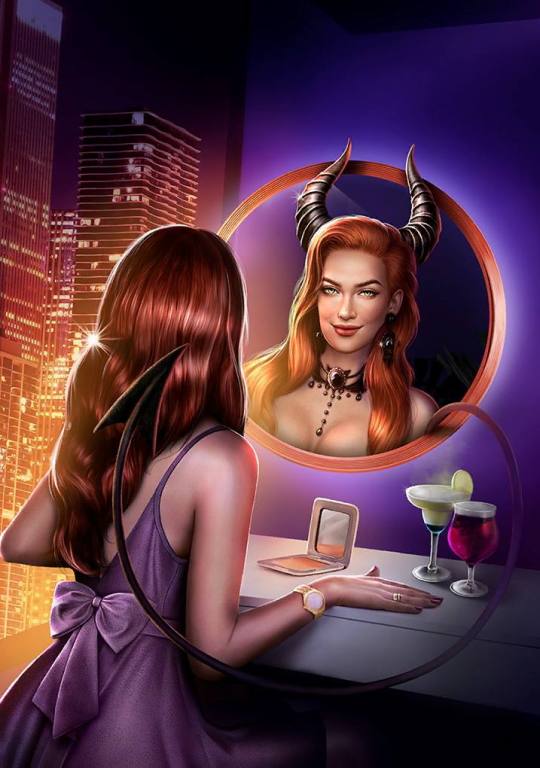
Greetings, dear Wincy! Today your favorite Romance Club turns 6 years old, and you are already celebrating your 3rd birthday with us. How are you feeling on this beautiful day?
Answer: Happy 6th Birthday! I can't believe I've been working at the Romance Club for 3 years and writing my second story! I am truly grateful for the passion and love with which you support us and our stories! Thank you for making our community so special!
We would like to ask you some interesting questions :)
1. How do you approach creating technical specifications for cut-scene artists? How do you decide where and when a cut scene is needed? Do you immediately imagine what you want to see or do you first look for a picture?
A: I think the ideal time for a cutscene is when a costly choice is being made, but sometimes I favor my favorite moments in updates.
2. What century would you like to find yourself in if you were the heroine of a visual novel and in what setting and genre?
Answer: This is a difficult question. From a writer's perspective, I love them all, just as I love writing fantasy, but I wouldn't want to live in a historical period with tyrant rulers and no flush toilets. Although, if I really had to choose, I would choose the Tang Dynasty during the reign of Emperor Taizong.
3. Has there ever been a time when you wanted to write a scene and the character took you down a completely different path, refusing to give in to the original idea?
Answer: Several times. The first one that comes to mind is Christina, Reinhold's childhood friend. I planned for her to be much more jealous, but when I got to this scene, I felt sorry for her because Reinhold would never reciprocate her feelings. So I abandoned the idea of her conspiring with her mother, instead placing all the blame for Ellaire's poisoning on the evil old witch.
4. Were there any scenes in Heart of Trespia that never made it into the plot for a variety of reasons? If there are any, could you briefly tell us about it?
A: There weren't many possible scenes included in the story, mostly due to character development or new plot twists that changed the course of the story. I can say that there is a secret ending for Wyatt, which I planned for a long time, but in the end it turned out to be inaccessible to the players. There's even a sketch of a diary. This ending requires Wyatt to go through a bad breakup with Ellaire, but there are enough improvements with him that he is able to survive the war. It seems to me that no one has yet managed to unlock this ending.
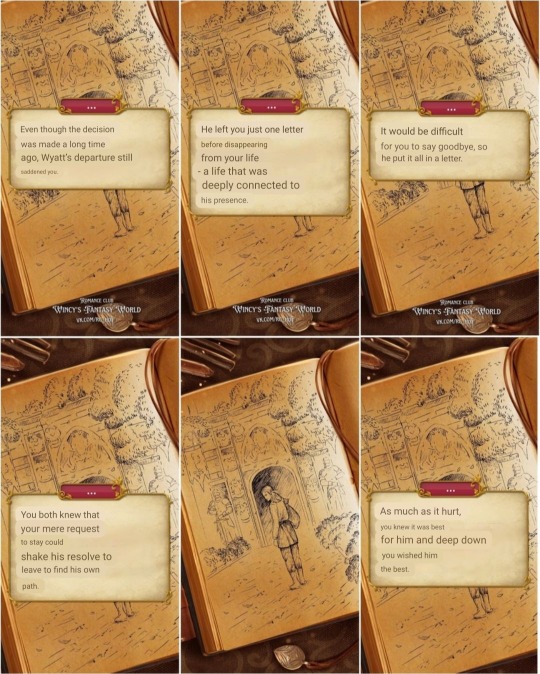
5. Knowing your approach to developing stories, you probably have drawn a map and thought out the political structure of the world, the types of magic used in it. Could you tell us more about the world order in Soulless?
Answer: “Soulless”, unlike “Heart of Trespia”, is an ordinary fantasy. Silverport is a fictional city based on Chicago. Besides adding some real world elements, much of the lore of this story is centered on supernatural elements such as Vincent's magic, the powers of various demons, etc. In terms of hierarchy, I'd say Trexio/Trexia is what you'd call the "supreme" demonic presence in Silverport, and Vincent acts as an accompanying force that is more like the administrative authorities in our world, maintaining order and not truly interfering in our daily lives unless we give them a reason to. The Vixaria, after all, is just “one of us” trying to navigate a fast-paced world with no major strings attached other than not killing people.
6. Who proposed the idea of introducing such new features into “Soulless” as choosing love preferences, stat tips, different descriptions of romantic scenes - you or the management?
Answer: Including selection hints was the team's idea. I suggested other ideas, and we worked together to implement them. I've been wanting "thought clouds" ever since I wrote ST! You have no idea how excited I am to finally see all those cute little clouds showing off Vixaria's evil thoughts with her smug grin.
7. Surely many will be interested to know, including us, how long in the story of “Soulless” it will be possible to carry on parallel love lines? And will this affect the relationship with the finally chosen character in the future?
Answer: Honestly, I don't have a definitive answer to this question right now, but I think you won't have to choose until at least the middle of the second season. Until then, I'll try not to punish players for exploring different paths, but I can't promise anything just yet.
✅Favorites in full size/Characters in full size:

8. Finally, what would you wish to the Romance Club team on this day?
Answer: I wish that the Romance Club continues to expand throughout the world! Our stories are too beautiful not to be known in all corners of the world.
Thank you for your time! We congratulate you and your entire YSI team on the birthday of your favorite application! And we wish you all inspiration, stunning ideas and prosperity.
Wincy also shared with us the sketch and Wyatt’s original version. Wincy also shared with us a sketch and the initial version of Wyatt.
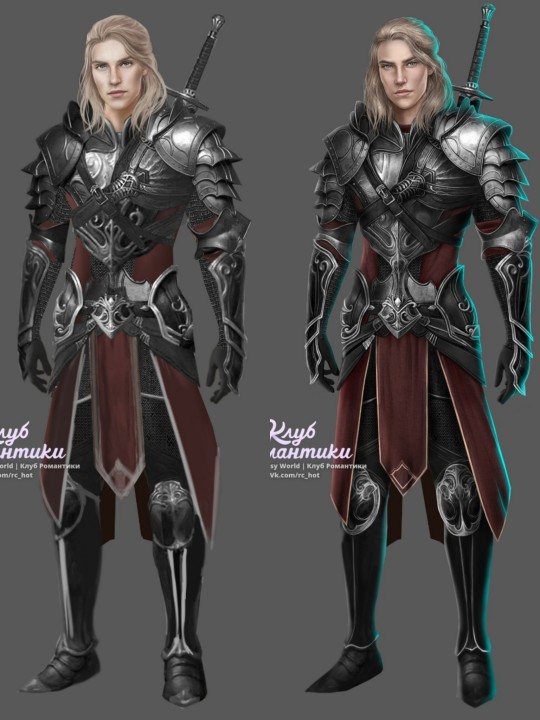
Source: Wincy's fantasy world | Soulless | ST | RC
20 notes
·
View notes
Note
I've heard that Wukong has a heart of gold (literally), as well as iron lungs, and a metal spine from being in Lao Tzu's furnace and eating molten Copper from Guan Yin and was wondering if this is true.
Monkey states that in ch. 34:
When old Monkey caused great disturbance in the Celestial Palace five hundred years ago and was refined for forty-nine days in the eight trigram brazier of Laozi, the process in fact gave me a heart strong as gold and viscera hardy as silver, a bronze head and an iron back, fiery eyes and diamond pupils (Wu & Yu, 2012, vol. 2, p. 131).
The legend of his adamantine body predates the 1592 JTTW. For instance, Sun claims the following in the early-Ming zaju play:
I plundered Laozi’s gold Pill of Immortality, and have endured so many alchemical transformations that my muscles are brass, my bones iron, my eyes fire, my pupils gold, my asshole lead and my prick is pewter (Ning, 1986, p. 142).
Another example comes from the 13th-century JTTW. He is referred to as the the “Bronze-Headed, Iron-Browed King of the Eighty-Four Thousand Monkeys of the Purple Cloud Grotto on the Mountain of Flowers and Fruits” (Wivell, 1994, p. 1182). And the story ends with the Tang Emperor Taizong enfeoffing him as the “Great Sage Steel Muscles and Iron Bones” (Wivell, 1994, p. 1207).
Sources:
Ning, C. Y. (1986). Comic Elements in the Xiyouji Zaju (UMI No. 8612591) [Doctoral Dissertation, University of Michigan]. ProQuest Dissertations and Theses Global.
Wivell, C.S. (1994). The Story of How the Monk Tripitaka of the Great Country of T’ang Brought Back the Sūtras. In V. Mair (Ed.), The Columbia Anthology of Traditional Chinese Literature (pp. 1181-1207). New York: Columbia University Press.
Wu, C., & Yu, A. C. (2012). The Journey to the West (Vols. 1-4) (Rev. ed.). Chicago, Illinois: University of Chicago Press.
116 notes
·
View notes
Text
From our most recent batch release:
Zhang Song recites the military treatise by Cao Cao, called 孟德新书 or New Book of Mengde.
In history, this book did actually exist, called "[Duke] Cao's New Book" 曹公新书, referenced by the Records of the Three Kingdoms and elsewhere. The book was modelled after Sun Tzu's Art of War, but unlike in Romance of the Three Kingdoms, was never actually burnt by Cao Cao later and was passed down for many generations, notably still being referenced by the first emperors of Tang Dynasty in "Questions and Replies between Tang Taizong and Li Weigong" as a noted military manual.
However, the contents of it are sadly lost to time by today.
For the 1994 Three Kingdoms show, the writers actually wrote their own take on Cao Cao's lost military treatise, using many other military treatises of Chinese history as well as Cao Cao's own methods of warfare and pragmatism as inspiration, all written within the style and language of the time. Another legendary showcase of the writers' abilities, and one of many original additions of 1994 series that blended seamlessly with the material.
#three kingdoms#chinese drama#dynasty warriors#chinese history#hanfu#historical#period drama#romance of the three kingdoms 1994#rotk
14 notes
·
View notes